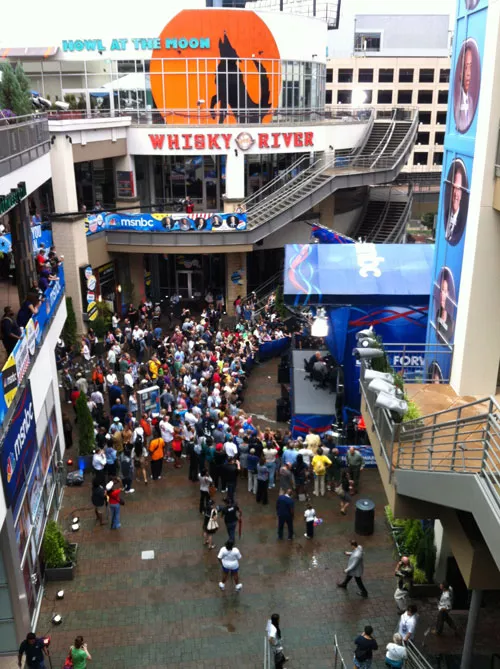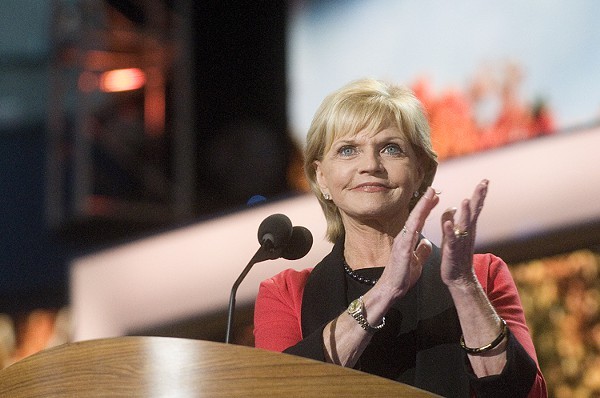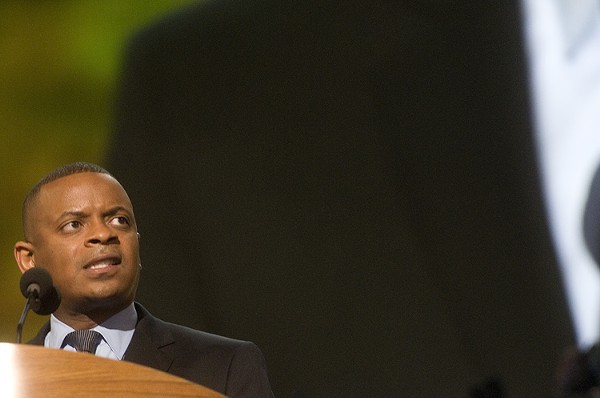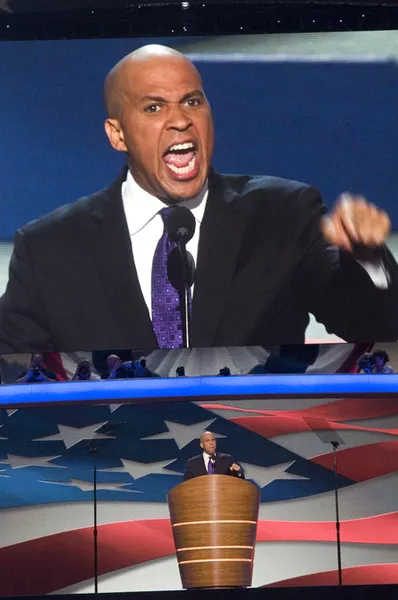The scene around Charlotte on Day One of the Democratic National Convention was much like a music festival: hot and humid, with random rain showers and hipsters aimlessly pillaging around. There were Bible-beating mouth breathers preaching hate on street corners, graphic photos of aborted fetuses painted on trucks passing by, and undocumented immigrants staging sit-in protests on the streets.
The EpiCentre morphed into a red, white and blue colored haven for Ivy League wonks and Beltway pundits seeking shelter from the storms. The various delegates, campaign staffers, pollsters, and professional activists hovered around the MSNBC stage like moths around a flame. (Who knew Chris Matthews had a cult following?)

- Jeff Hahne
- EpiCentre crowd madness
And with the jocks and surgically enhanced sorority girls gone for a week, it sure felt like Nerd Prom around the downtown clubs — though Ashley Judd was walking the streets in a skirt to keep things attractive.
Inside Time Warner Cable Arena, the audience at least looked like a sampling of a diverse America, with faces of all races and creeds, many of them young and seemingly most of them female. There was no national debt counter, but there were hundreds of social media addicts updating statuses relentlessly. Gil Scott-Heron was right: The revolution will not be televised. Instead, it will be Tweeted and blogged by over-caffeinated graduate students who can't find good paying jobs in their field.
But so far, this year's DNC hasn't been the revolution of 1968. Democracy hardly takes place inside the building anymore — the days of floor fights and drafting dark horse candidates are long gone — with conventions being judged now by poll bounces and the approval of cable news commentators. And democracy on the streets was savagely suppressed by cane-wielding cops, most of them from out of town.
So the major public relations objective for convention planners from the DNC, OFA and the West Wing was to reach out to independent women and disengaged youth, and to fire up minorities of the base for the fall campaign. And in that sense, the first night of speeches was mission accomplished — or at least it appeared that way from inside the arena. Whether or not viewers switched over from reality TV to C-SPAN to watch any of it is another question.
Gov. Bev Perdue took to the podium around 6 p.m. to welcome the delegates to the state. And the largest crowd she will ever address witnessed the swan song speech of her political career. She was OK, but she seemed to skate through the moment, failing to emphasize the jesting attack lines on Mitt Romney’s personal wealth and lack of support for women’s rights that were the crux of her argument.
For her, Tuesday was like the mid-level bowl game for the seniors of a once promising college football team that disappointingly underperformed during the season. It was her last big game, and she didn't leave it all out on the field.

- Joeff Davis
- Gov. Bev Perdue
An hour later, it was Mayor Anthony Foxx’s time in the spotlight, in his first big game. He talked of growing up in a Charlotte struggling with the effects of desegregation. “I was one of those children; I learned what it truly meant to be judged by the content of one’s character,” Foxx said, with the line of the night from a North Carolina politician.

- Joeff Davis
- Mayor Anthony Foxx
If the convention ends well and gives President Obama that poll bounce, Foxx will have a launching point to run for higher office in 2016. And if he ever becomes the first African-American statewide senator or governor of North Carolina, he will get to continue telling his story during longer speeches in different cities.
For a convention tailored mostly to the middle class, it was also refreshing for keynote speaker Julian Castro to relate tales of poverty — and it was more honest for him, because many of them were his own.
First Lady Michelle Obama gave the best political speech ever given by a sitting First Lady, one that must be watched in entirety because no comment could do it justice. My favorite part: "If farmers and blacksmiths could win independence from an empire ... if immigrants could leave behind everything they knew for a better life on our shores ... if women could be dragged to jail for seeking the vote ... if a generation could defeat a depression, and define greatness for all time ... if a young preacher could lift us to the mountaintop with his righteous dream ... and if proud Americans can be who they are and boldly stand at the altar with who they love ... then surely, surely we can give everyone in this country a fair chance at that great American Dream."
Besides Castro and Michelle Obama, the best overall speakers were Massachusetts Gov. Deval Patrick and Newark, NJ, Mayor Cory Booker, who both gave the most partisan addresses of the night, and did so with idealistic passion. They also showcased the depth of the Democratic bench for African-American leaders on the east coast, a bench which now includes Mayor Foxx. If there was no Barack Obama, all three would be viewed as the potential first black president. But there are still a great many barriers left for all three to break themselves.

- Joeff Davis
- Cory A. Booker, mayor of Newark, New Jersey
In the coming years, let’s also hope that there's a similar deep bench of black females and Hispanics of both sexes. With Castro getting the keynote and Michelle Obama tugging at middle America's heartstrings, there should be plenty of inspiration for young minorities back home to achieve and make that happen in the 21st century.
